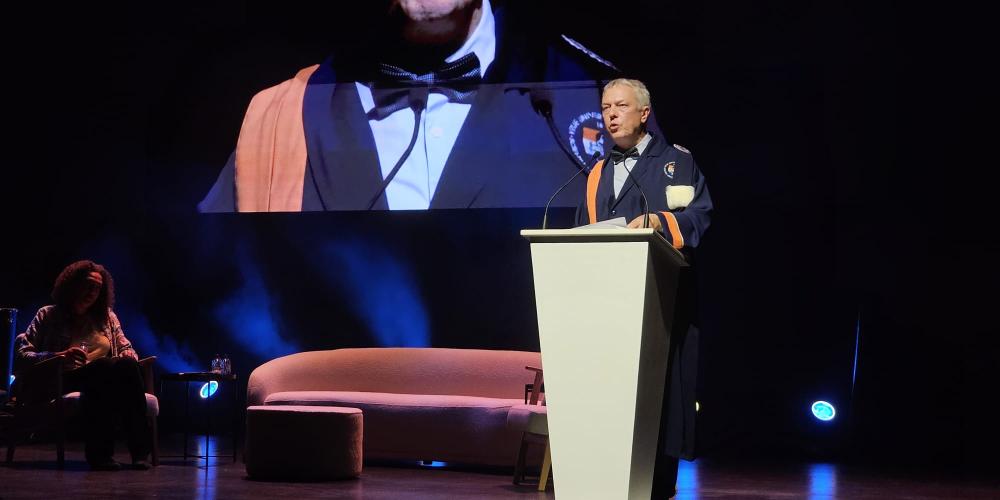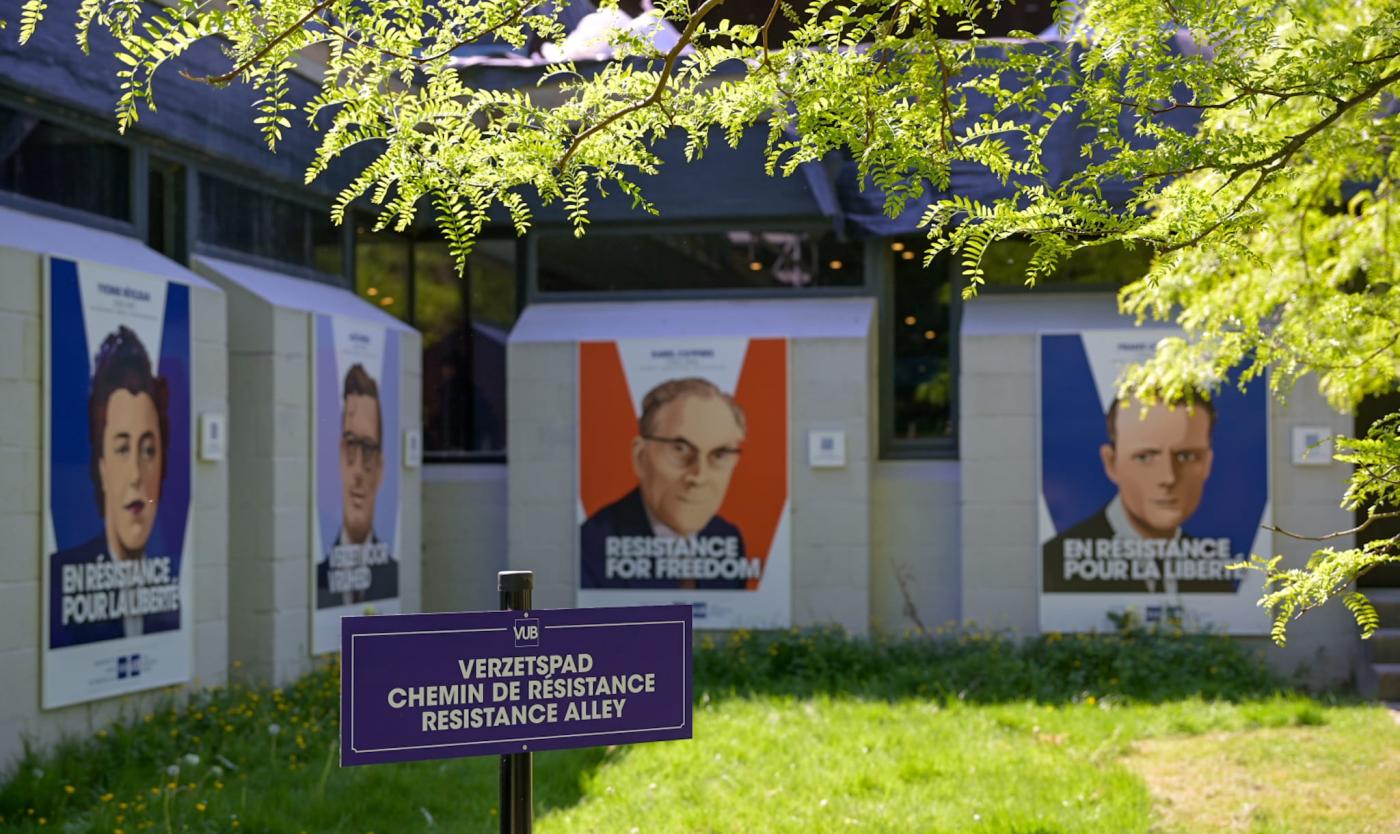
VUB Rector Jan Danckaert’s address at the opening of the academic year: Why the world needs open minds. In his speech marking the start of the new academic year, Rector Jan Danckaert openly pondered why the world needs free thinkers, or open minds. By this, he refers to minds that thrive on respectful dialogue, which leads to new insights. Of course, the world cannot do without such free thinkers. “The free mind has been absolutely crucial to the progress we have made as humans,” says the rector.
“Throughout history, you can see that free thinkers, from any philosophical background and in every cultural context, were pioneers, particularly in science. We need them more than ever today, especially as we face so many challenges, such as authoritarianism, wars, and even the influence of tech giants and algorithms that exacerbate polarisation. Moreover, the free mind is under pressure due to extreme divides, as seen in the discussions around 'woke' and 'anti-woke'."
Everyone, of course, has the right to think as they wish. “The VUB has always been a staunch defender of free minds. This is evident in our historical engagement. We were pioneers in artificial fertilisation because we felt free to challenge nature. This stems from the philosophy that science should serve progress, not just technology for its own sake. The same applies to other ethical issues such as abortion, euthanasia, and more recently, LGBTQ+ rights, where the VUB has always played a leading role."
"We must always return to our roots and ask what ‘free’ means"
Danckaert is a scientist himself. Does he also possess an open mind, or is this less relevant in thermodynamics? “Thermodynamics is about the exchange of energy and information. In open systems, where continuous interaction with the environment takes place, new structures can emerge. We call this ‘emergence’. I see it as a metaphor for the free mind and an open society: if you are open to different influences, new ideas can emerge that you couldn’t have imagined before."
“This openness has been deeply rooted in the VUB since its founding. Our university is unique because, from its inception in 1834, it has been independent of both church and state, which was revolutionary at the time and remains rare in today’s world. This makes us special, but it also brings responsibility. We must always return to our roots and ask what ‘free’ means in the context of our time. That remains the task that Pierre-Théodore Verhaegen left us.”
Global citizens
“My message is that the free mind is not just a historical legacy, but something we must continue to cultivate today. At the VUB, we aim to shape students into global citizens who are committed to, among other things, a more sustainable society. We do this by encouraging them to think beyond their own frameworks and engage in dialogue with people from different backgrounds. Free minds don’t just happen; they need an open and tolerant society to flourish."
"Students must be willing to address gaps in their own skills."
Finding people from diverse backgrounds is not difficult at the VUB. Each year, the university sees a growing number of international students and students from diverse backgrounds, making the campus a vibrant and welcoming place. “The VUB is a micro-society where young people from different backgrounds meet. In the Flemish higher education landscape, the VUB is probably the most diverse university. This diversity offers enormous potential, but we must also actively ensure that students truly connect with each other, rather than staying within their own communities or online forums. An open dialogue, even on sensitive topics, is essential. It is our task to help students grow into global citizens, and that starts by meeting others with an open mind. We call these brave encounters."
This diversity also brings challenges that other, perhaps ‘whiter’, universities may face less often. Brussels is a multilingual environment: the people who live, visit, work, or study here don’t always speak the language of instruction, which in most courses is Dutch, well enough. The VUB is working hard to address this. “We place a lot of emphasis on language proficiency, for example through an academic Dutch language test at the start of studies. Students who score less than 60% are encouraged to follow remediation courses, both online and in group sessions. For some programmes, such as law, a strong language level is crucial. We expect students to develop this, but we also offer support where necessary. However, it is not our job to completely make up for gaps left by secondary education. Students must be willing to address shortcomings in their own skills."
Optimism
Humanity’s relationship with nature and technology is under pressure and needs rethinking. “For centuries, humans have tried to become more independent from nature by developing technology that reduces our vulnerability. We saw this during the Industrial Revolution, with the development of machines, and today we see the same with how we handle information. Science continues to evolve, but there are always limits to what we can and should do.”
"If we’re under pressure from both woke and anti-woke, then we’re probably on the right track."
This applies to both the benefits and dangers of far-reaching digitalisation: “We want to escape the black box we’ve ended up in due to abrupt digitalisation, through the disruptive breakthrough of generative AI and the algorithms of tech giants that lead to polarisation. We must therefore rethink our relationship with technology, and perhaps regulate it as well. This is also what our honorary doctor Yuval Harari says in his latest book Nexus. He even sees AI as an existential threat to humanity and democracy. If AI replaces humans, democracy is at risk."
The challenges of our rapidly advancing technological society, where everyone can voice their opinions on digital forums, put free thinking under pressure. But Danckaert remains optimistic: “If we’re under pressure from both woke and anti-woke, then we’re probably on the right track. That balance, that tension, is important for a free and progressive society. What does that mean for our campuses, for our scientists, for our students? Pierre-Théodore Verhaegen, who founded us in 1834, already told King Leopold I: Examiner, en dehors de toute autorité politique ou religieuse, les grandes questions qui touchent à l'homme et à la société, sonder librement les sources du vrai et du bien, tel est le rôle de notre Université, telle est aussi sa raison d'être. To which I would only add in 2024: Les grandes questions qui touchent à l'homme, à la société et à la planète."
“And finally, I must say, while I wholeheartedly wish the KU Leuven and UC Louvain all the best in celebrating their 600th anniversaries, I do find it striking that they so explicitly associate their celebration with the Pope’s visit to our country, especially given the Catholic Church’s struggles with issues like handling misconduct and individual rights."

